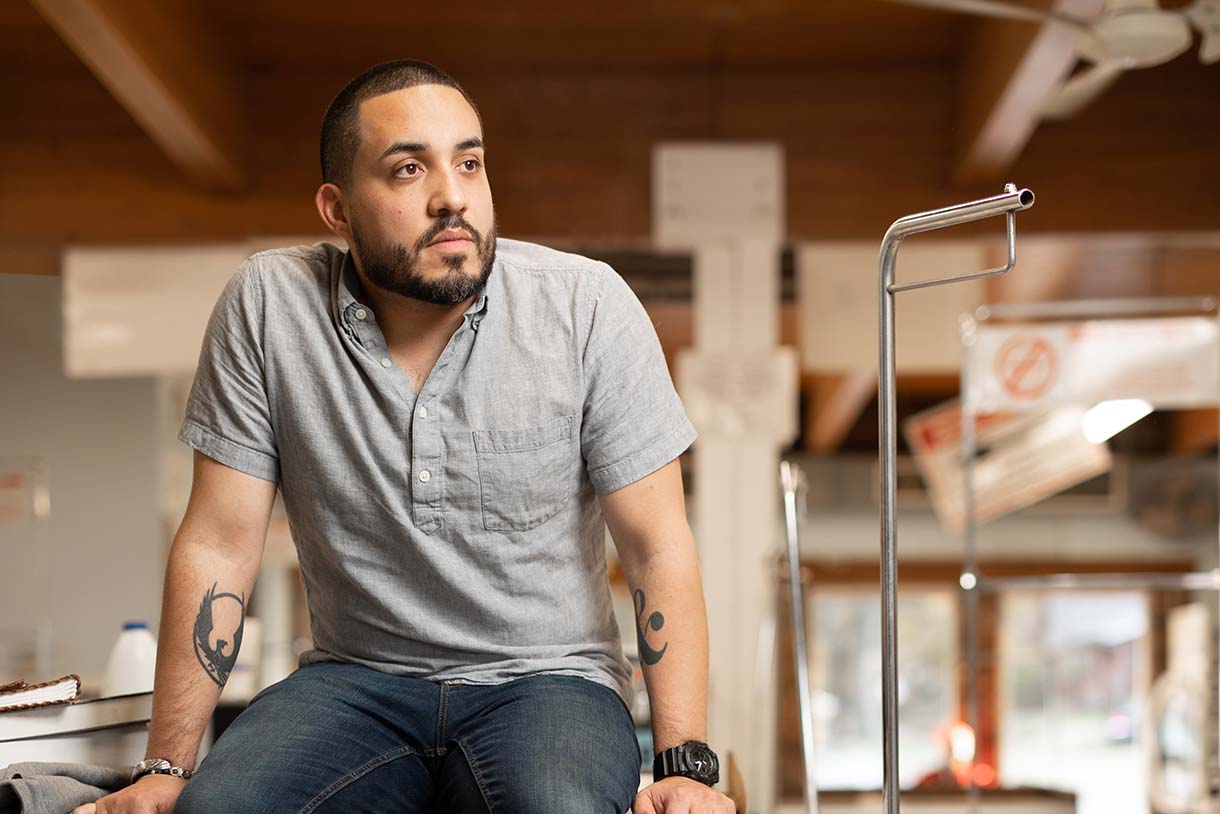Efroymson Creative Writing Series Welcomes First Artist of 2023
 Poet Laureate Emeritus of Kansas Huascar Medina. Photo used with permission.
Poet Laureate Emeritus of Kansas Huascar Medina. Photo used with permission. As a part of the Efroymson Creative Writing Series, the English and Creative Writing Department will host Poet Laureate Emeritus of Kansas Huascar Medina on February 16. He has two published books of poems, Un Mango Grows in Kansas andHow to Hang the Moonand his work has appeared in The New York Times, Latino Book Review, Flint Hills Review, KANSAS! Magazine, and Green Mountains Review, among other publications. Medina is also literary editor for seveneightfive magazine, a Sunday columnist for the Kansas Reflector, and a staff editor at South Broadway Press.
The Efroymson Creative Writing Series brings prestigious, award-winning fiction writers, poets, and nonfiction writers to campus. The conversations had at the events aim to challenge traditional discourse and embrace culturally relevant, diverse voices.
Poetry as an art form lends itself well to these important dialogs, providing a space to communicate about complex issues.
“Poetry is the language of emotion,” Medina says. “Poetic discourse is perfectly equipped to promote cultural empathy. The Efroymson Writing Series elevates and amplifies diverse voices, which can reduce insularity within any community by allowing access to the readings and conversation generated by the writing series.”
Medina writes from the perspective of a child of immigrants. His mother immigrated from Chiriquí, Panama and his father from Yabucoa, Puerto Rico. Their sacrifices influenced his most recent book of poems Un Mango Grows in Kansas, published in 2020.
“Un Mango Grows in Kansas is a lived experience, and the knowledge I share is not rare or unique,” Medina says. “It is the experience of a new American, one of the most American stories we can tell.”
Medina notes that immigrants and the immigrant experience are often politicized and misrepresented to create division and advance political agendas. When members of these communities share their own stories, he says these narratives can be changed and redefined.
“I write from a genuine desire to connect,” Medina says. “Xenophobia is not always racism. That insularity is an environment in which xenophobia, racism, and white supremacy thrive. That first-generation trauma is also intergenerational trauma. That my writing is not political. It's personal.”
Along with finding inspiration from his personal experience, he draws from the works of poets like Pablo Neruda, Paul Laurence Dunbar, Jimmy Santiago Baca, Saul Williams, and Mary Oliver among others.
“I find inspiration for my work by being present and open,” Medina says. “Neruda talked about seeing the word anew each day, like a newborn leaving their mother's womb to enter the world. I hope to find that level of daily discovery.”
That spirit of openness is one of Medina’s biggest sources of advice for aspiring writers.
"Vulnerability and authenticity are great literary devices for any aspiring writer to master,” Medina says. “Every sensation is part of a story. I know they say to write what you know, but I suggest you start writing about what you are feeling. Not investing emotionally in your work makes it difficult for others to care enough to consume it.”
By bringing Medina’s unique perspective and professional experience to the South Loop, English and Creative Writing Department Chair Jeanne Petrolle hopes that Columbia community members can make discoveries of their own through Medina’s work.
“The Efroymson Creative Writing Reading Series enables our students to dialogue with highly successful writers about creativity, writing, publishing, and career success strategies,” Petrolle said. “We are extremely fortunate to be able to offer our students time with such celebrated creatives.”
Associate Professor and award-winning poet CM Burroughs, whose book Master Suffering was nominated for a National Book Award, has spent the last few years helping to curate readers for the series. She sees the series as an opportunity for young authors to hear from those who were once in their shoes.
“Our reading series offers enrichment beyond the solitude of reading a book, giving students and the Chicago community opportunities to understand an author’s intentions in how they read and perform, the stories they share with the audience, and the questions they answer afterward,” Burroughs says. “These authors demystify the process of writing as they discuss what they do and make their craft more accessible to the imagination.”
She hopes interacting with authors like Medina will help young writers understand the grit it takes to succeed in an artistic career as well as inspire them to tell their own stories.
“We bring writers of diverse backgrounds so that our students and the Chicago community can see themselves mirrored on stage,” Burroughs says. “Everyone ought to be able to imagine themselves in such a position.”
Medina values the opportunity to connect with aspiring writers, believing that coming together as a creative community is valuable to writers’ development.
“Professionally, aspiring writers need to connect with other writers outside of their immediate proximity to extend networks and share access to resources,” Medina says. “Every reading is an opportunity to connect. Whether I am reading in front of an audience of hundreds or one person, each event matters to me. We are in a community with each other, not competition.”
Medina values the time and space that writers and members of the community take to create conversations like the Efroymson Creative Writing Series and looks forward to the chance to work with the Columbia community.
“I am privileged to be a writer,” Medina says. “The notion that a stranger has chosen to converse privately with my words is humbling. Thank you for sharing your inner spaces.”